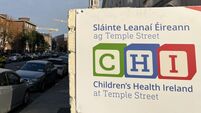Seven healthcare workers died due to coronavirus, Oireachtas Covid-19 committee to be told

Healthcare workers from black, Asian and minority ethnic communities are at higher risk of contracting Covid-19 than their white colleagues, TDs will be told tomorrow.
In a submission to the Oireachtas Covid-19 committee, the Irish Medical Organisation (IMO) will say research shows ethnic minorities are more likely to get the coronavirus and the Irish system has a “high reliance” on non-EU/EEA doctors and nurses.
The committee will also hear, as of the July 11, of 26,076 COVID-19 cases confirmed in the country, 8,347 (32%) were healthcare workers. Some 319 were hospitalised, with 49 admitted to ICU.
The committee is chaired by Independent TD Michael McNamara and includes leading politicians like Fianna Fáil’s John McGuinness, Labour’s Duncan Smith and Solidarity/People Before Profit TD Bríd Smith.
They will hear that 7 healthcare workers have died as a result of Covid-19.
Of the 8,347 healthcare workers who contracted Covid-19, 2,711 were nurses, 2,189 were healthcare assistants, and 507 were doctors.
Some 2,657 cases (30%) were related to an outbreak in a nursing home, residential institution, or community hospital/long-stay unit, while 725 cases (8.6%) were linked to an outbreak in a hospital.
More than 70% of healthcare workers contracted Covid-19 in the workplace. Many of the cases under investigation may also be linked to the workplace, the IMO will say.
Ireland appears to have one of the highest rates of infection among healthcare workers in Europe and the IMO is calling on the HSE to ensure adequate supplies of PPE for the possibility of future surges of Covid-19 or other pandemics by stockpiling reserves, diversifying suppliers and creating incentives to encourage local manufacturing of PPE.
The committee will also hear from the trade union Fórsa which will say the rate of infection among healthcare workers is “in excess of both the European and World averages.”
Fórsa had many reports of healthcare workers who re-assigned to duties directly related to the pandemic response and became infected.
“Even those with the mildest of symptoms and effects at the time of infection, report that almost three months later, they feel that they are only close to full recovery now,” the committee will hear.
Fórsa will say the infection of more than 8,000 workers means that 7% of the workforce were forced into workplace absence. This comes on top of normal absence rates. So, for direct intervention areas, during a pandemic, resources were decreased by in excess of 10%.
“However, large scale re-assignment took place on a voluntary basis into areas such as 7 day swabbing, nursing home settings, residential settings,” the committee will hear.
TDs will also take testimony from the Neurological Alliance of Ireland (NAI) which will say the lack investment in the sector before Covid-19 means services were “already at breaking point”.





